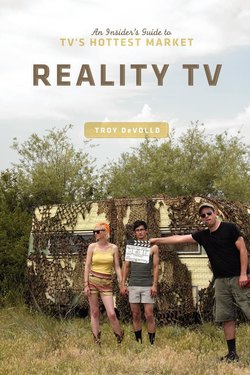Читать книгу Reality TV - Troy DeVolld - Страница 8
На сайте Литреса книга снята с продажи.
ОглавлениеForeword
by Patric M. Verrone
Patric M. Verrone has been a television writer for 25 years and his credits include The Tonight Show Starring Johnny Carson, The Simpsons, and Futurama. He was President of the Writers Guild of America West from 2005 to 2009.
Alfred Hitchcock said that “drama is life with the dull bits left out.” That adage has generally held true because audiences won’t sit still for long watching “life with the dull bits left in.” Yet there is a continuum between watching three minutes of YouTube footage of a ship sinking and watching three hours of the film Titanic; and along that continuum is ever-increasing input by that most human of endeavors — the creative process. Despite having “value” throughout, we typically call the more highly produced end of the continuum “entertainment,” and the other end we consider “news,” or “documentary,” or possibly even “sports.” It is no surprise, therefore, that Reality TV, despite its financial success, ratings records, and even self-made controversies, finds itself near the end of the continuum where creativity is both downplayed and devalued. As such, much of the rest of the television industry has had a persistent disaffection and distrust of Reality TV for being cheap and under-produced, and of its creative personnel for being “non-creative.” To borrow another classic Hollywood cliché, while Judy Garland and Mickey Rooney epitomized the Tinseltown enthusiasm of “Let’s put on a show,” Reality TV is perceived to be advocating the more mundane, “Let’s let a show put on itself.”
The reality of Reality Television, however, is that there is a tremendous degree of creativity at work, especially in the storytelling, which, through no coincidence, is where the most concerted efforts have been made to disguise and conceal the creative process. No one doubts the contribution of the storyteller in print journalism who cobbles together written-down snippets of other people’s expressions (be they answers to direct questions, original utterances, or merely observed behavior) and then weaves them with their own words into a narrative story. Yet that’s exactly what goes on in Reality TV, where story producers and editors cobble together moving images of other people’s expressions and then interweave them with vocal narration (that someone wrote) into a visual story. The significant difference, however, is that the print journalist gets the most obvious and profound credit available in a pure “byline,” while the Reality TV storyteller gets a nondescript and non-descriptive credit hidden somewhere in tiny letters at the bottom half of the television screen at triple speed while the viewer is reaching for the remote control.
Call the job what you will: “Writer,” “Creative Consultant,” “Story Producer,” or a dozen other titles; there is still a narrative craft being performed in Reality TV that transports the story from the real world onto your television screen. It’s been a fight to gain “recognition” for Reality storytellers (the term “recognition” has dual meaning here, both as a synonym for “credit” — both on- and off-screen — as well as the ability to include someone in the class of workers who are entitled to union benefits under American labor law), and that is itself part of the mystification of Reality Television. If a storyteller’s work is rendered invisible, they can’t be recognized, and no one gets the credits or benefits. While there have been a few successes in the drive to get Reality storytellers covered under Writers Guild contracts (Bravo’s Intervention, National Geographic Channel’s The Dog Whisperer, and some writers on ABC’s Dancing With the Stars) thanks to concerted anti-union corporate behavior (like firing the entire writing staff of America’s Next Top Model when they went on strike for a WGA contract); too many qualified people for too few jobs (most with little leverage to make demands on their own, much less able to hold out for their colleagues); and the momentum of Hollywood (epitomized by the loyalty attributed to the boy at the circus who sweeps up the elephant dung, “What? And give up show business?”) have kept these writers and storytellers from getting their due. I hope I haven’t completely dissuaded you from wanting to work in Reality TV, because despite screenwriter William Goldman’s assertion (and my final Hollywood cliché) that “No one knows anything,” you hold in your hand the work of someone who not only knows something, he knows all there is to know about the creation and production processes in Reality TV. Troy DeVolld has worked on some of the highest-rated and most respected Reality TV productions of the past two decades (plus, as even he would candidly admit, some productions that were, well, “not-so-much”), and has generously yet discreetly “spilled his guts” for your enlightenment, edification, and enjoyment. And best of all, he left the dull bits out.
